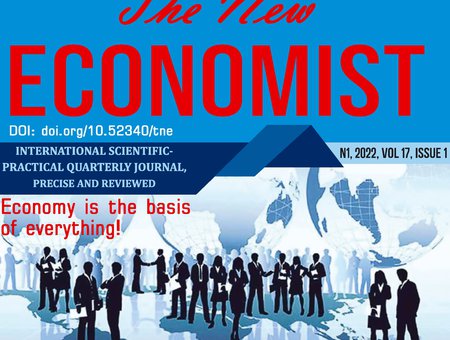The paper work talks about the great negative impact of the pandemic on Georgian business. If in the period 2013-2019, before the pandemic, business in Georgia was developing significantly, in 2020, after the pandemic, it began to fall. This was especially the case in small businesses, where turnover (98.9%), output (99%), financial performance (99%) and employment (85.4%) decreased compared to 2019. Due to anti-pandemic restrictions, 49,446 jobs were lost in small businesses, with the same number of people joining the already large army of unemployed for an indefinite period.
In such a situation, the unemployed need protection. The author of the article shares the opinion of other scientists that it is time to introduce unemployment insurance in Georgia. He also supports the opinion of other Georgian scientists (V. Papava, V. Charaia, L. Sachaleli and others) that the atypical crisis caused by the pandemic needs special study, that it is time for a new understanding of economic policy, adaptation to a new, pandemic reality. In order to implement the ISO-9001 standard in small businesses, etc.
References:
- Papava V. (2020). Citation: On the Atypical Economic Crisis under the COVID-19 Pandemic, Economics and Business Journal, 4, 9-16.
- Kakulia M. & Capanadze N. (2020). Citation: Impact of Anti-pandemic Restrictions on Economic Growth: Visible and Invisible Loss. Economics and Business Journal, 2, 17-39.
- Mekvabishvili E. (2021). Citation: Coronomic Crisis Challenges for the and Georgia. Economics and Business Journal, 1, 27-33.
- Kurdgelia n. (2021). Citation: Impact of the COVID-19 pandemic on the functioning of small and medium-sized businesses in Georgia. The magazine „Economist“ , #2, 148-155. (In Georgian)
- Tokmazishvili M. (2017). Citation: Supporting the Development of Small and Medium Enterprises (Development of Value Growth), Tbilisi, National Parliamentary Library of Georgia. (In Georgian)
- Business Sector in Georgia (2020). Citation: Statistical Publication, National Statistics Office of Georgia. 110. (In Georgian)
- Business Sector in Georgia (2021). Citation: Statistical Publication, National Statistics Office of Georgia. 110. (In Georgian)
- Kakulia M., (2020). Citation: Lessons from the Economic Crisis for Georgia, The magazine “Economics and Business”, 2, 44-55. (In Georgian)
- Bochoidze L., Chinchaladze M., (2020). Citation: New tasks for the social economy in the wake of the COVID-19 pandemic crisis. The magazine ”Business-Engineering”, 3-4, 93-95. (In Georgian)
- Archvadze J. (2021). Citation: Transformation of State Function in the Post-Pandemic Period, The magazine “Economics and Business”, 1, 34-43.
- Charaia V. (2020). Citation: Coronomics - Danger or Opportunity, The magazine “Economics and Business”, 2, 68-72. (In Georgian)
- Benashvili G. (2020). Coronomiks - The Necessity of Re-Understanding Economic Policy, The magazine “Economics and Business”, 2, 72-81. (In Georgian)
- Sachaleli L., Sachaleli N. (2020). Citation: The role of ISO standards in business development in the pandemic period, The magazine ”Business-Engineering”, 3-4, 187-190. (In Georgian)




